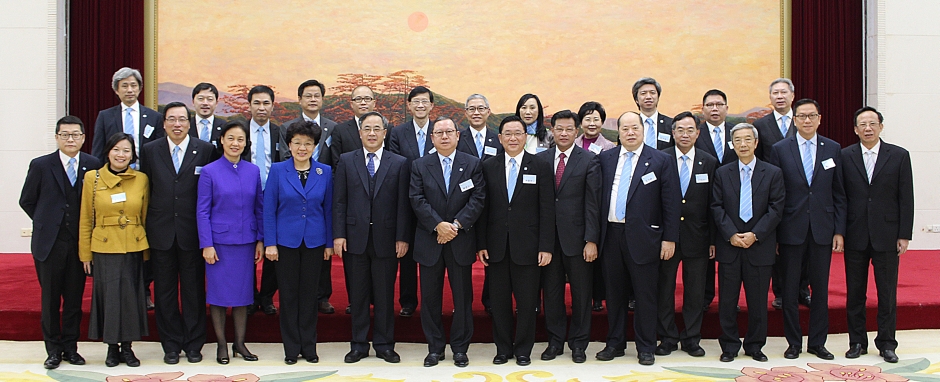
The Business and Professionals Alliance for Hong Kong (BPA) today (27 January) organised a delegation to Guangdong. The objectives of the visit were to exchange views on issues of common interests through meetings with various Guangdong officials, and to deepen cross-border cooperation for the mutual benefit of the SAR and the Province. Mr Peter Lam, head of the delegation and BPA Council Chairman, welcomed joint efforts by Guangdong and Hong Kong to promote economic development and pointed out that “economic integration”, “fostering development” and “promoting stability” were the current priorities for Hong Kong, as well as the BPA.


During their visit, delegates met with Mr Hu Chunhua, Secretary of the Guangdong CPC Committee, Mr Wan Qingliang, Secretary of the Guangzhou CPC Committee and Mr Lin Xiong, Director of the United Front Department, Guangdong CPC Committee. A wide range of issues were touched upon during the discussions. These included challenges faced by Hong Kong SMEs in upgrading and transforming their businesses, opportunities for Guangdong – Hong Kong cooperation in developing e-commerce platforms, streamlining of the individual tax regime for cross-border workers, young entrepreneurs’ pursuit of business opportunities on the Mainland, deepening cooperation in the engineering industry, facilitating capital movements and cross-border business for financial institutions, and the development of quality living areas for Hong Kong retirees in Guangdong.
Mr Andrew Leung, BPA Chairman, welcomed the proposed establishment of a Guangdong-Hong Kong-Macao Free Trade Zone (FTZ) as this would provide an important platform from which Hong Kong and Macao enterprises could explore the Mainland market. He said that the BPA would be pleased to promote the FTZ and relevant projects to the industrial and commercial sectors in Hong Kong. He also hoped that Guangdong and Hong Kong governments would provide greater support for SMEs’ efforts to upgrade and transform their operations. Mr Hu said that cooperation with Hong Kong was beneficial to Guangdong’s competitiveness and the establishment of a FTZ could further enhance the standing and importance of the existing cross-border partnership in the international marketplace.
Mr Leung also referred to the fast-paced development of e-commerce on the Mainland, where RMB625 million worth of business was transacted last year, representing a 27% year-on-year increase. He pointed out that Mainlanders often visited Hong Kong for shopping and e-commerce could become an important channel for Hong Kong enterprises to further expand their reach into the Mainland market. Through comparative advantages in branding and logistics, Guangdong and Hong Kong could leverage on their combined strengths by cooperating in the development of e-commerce platforms for mutual benefit.
The northward relocation of industries has narrowed Hong Kong’s economic base thereby limiting development opportunities for young people. In that respect, Mr Jeffrey Lam, BPA Vice Chairman, proposed to set aside land in Nansha, Guangzhou for the purpose of nurturing companies, business professionals and young workers from Hong Kong. In response, Mr Hu agreed to give Mr Lam’s proposal serious consideration. Mr Wan also indicated that he would conduct thorough research on the feasibility of such an arrangement. In addition, the BPA proposed to streamline the individual tax regime for cross-border workers by implementing this under Guangdong’s “pilot implementation” mechanism. Under the proposed arrangement, workers would only be liable for taxes in their place of origin.
BPA and Guangdong officials also discussed the prospects for further cooperation between Guangdong and Hong Kong in developing cruise tourism. It was envisaged that the Guangdong and Hong Kong would collaborate by strategically combining their regional cruise markets to entice cruise operators into adding tourist destinations along South China onto their itineraries thereby attracting more overseas visitors.
Mr Christopher Cheung, BPA Vice Chairman, proposed that the provincial government set up a dedicated department for the dissemination of information on financial services and procedures on company formation. This department could also serve as an information clearinghouse for the latest policy updates and details on financial market liberalization measures, so that financial institutions with an existing presence in the Province and overseas investors can respond quickly by formally registering their business operations on the Mainland. He also proposed that Hong Kong qualified securities and investment employees recognized by the Securities and Futures Commission be allowed to work in their related fields on the Guangdong province.
Dr Lo Wai-kwok, BPA Vice Chairman, pointed out that the long history of cooperation between engineering industries in Guangdong and Hong Kong had been further bolstered through the Closer Economic Partnership Arrangement (CEPA). He hoped there would be a deepening of professional exchanges and cooperation to capitalise on market opportunities abroad. Ms Priscilla Leung, Legislative Councilor from the BPA, felt that the ‘silver hair’ market offered tremendous business potential and suggested developing quality living areas in Guangdong to cater for the demands of Hong Kong retirees.
The 32-member BPA delegation, comprising Legislative Councilors, District Councilors and representatives from the industrial and business sectors, met with officials from the Guangdong CPC Committee, United Front Work Department of the Guangdong CPC Committee and the Guangzhou CPC Committee. Meetings were characterized by candid discussions, useful insights and constructive exchanges on issues of common.




 Follow
Follow